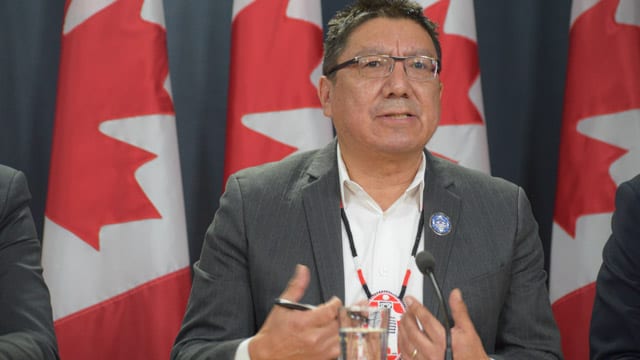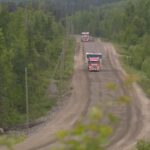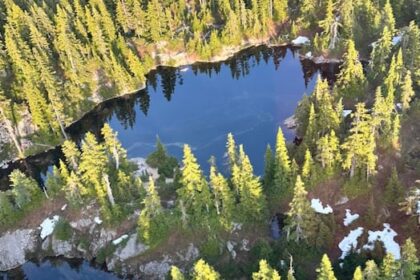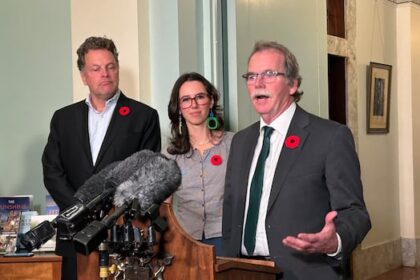One week before Prime Minister Mark Carney’s national summit with First Nations rights holders, many chiefs say they are still in the dark. “ There’s some information that’s coming out of Ottawa in bits and pieces. But in terms of how that meeting will be structured, who will be invited, what’s the agenda and when will that be available to our leadership? All we know is the venue,” said Grand Chief Alvin Fiddler of Nishnawbe Aski Nation (NAN), a political territorial organization that represents 49 First Nation communities in northern Ontario. “It’s certainly poor planning and to have an important gathering like this, with very little planning in advance of that meeting is – I think you’re setting everybody up to fail.” Carney has cast the summit as a way to “work through with Indigenous rights holders … where we’re going from here,” on the controversial One Canadian Economy Act. Chief Wifred King of the Gull Bay First Nation in Ontario said he received an invitation but won’t attend. “To me the bill has been passed so therefore I don’t really see any kind of movement in terms of any kind of amendments at this stage,” he said. “I don’t know what the real purpose of the meeting is going to be other than trying to assure the First Nations that they’ll have input in terms of major projects. “ A one-day meeting with potentially 600 chiefs – I don’t know how that’s going to go. And in addition to that, if it’s going to be an invitation by Zoom as well it will be pretty chaotic for First Nations to get their voices heard. I just think it’s going to be a waste of time.” Some haven’t received invitations and don’t know if they have been simply missed or if there was no intention to invite them in the first place. Chief David Monias of Pimicikamak Okimawin First Nation in Manitoba was not formally invited. “Should such an invitation be extended, I will assess it in the context of Pimicikamak’s inherent rights, governance structures and jurisdiction under both treaty, northern flood agreement and our traditional and customary law, “ he said. “As for the process surrounding Bill C-5, I am concerned about whether this meeting will reflect a true nation to nation dialogue, or whether it is part of a predetermined process driven by federal priorities.” Chief David Monias of the Pimicikamak Cree Nation did not receive an invitation. Across the country, the feeling is the same. Questions are mounting and the summit – meant to signal a new chapter – is off to an uncertain start. The version of the invitation obtained by APTN News is generic in nature. It’s not addressed to any one chief or organization. It simply says the summit is an opportunity for community leadership, First Nation rights holders and “other participants” to “discuss and shape how Canada will move forward on this Act.” The July 17 summit in Gatineau is the first of three meetings the prime minister pledged in response to backlash over Bill C-5, which passed with little consultation with Indigenous leaders on June 26, after being rushed through Parliament in only two weeks. Another meeting with Inuit leaders was promised for July and a meeting with Métis leaders is expected later this summer. No dates have been set. In the meantime, the Assembly of First Nations (AFN) has called a special virtual forum for July 10 to review the legislation now that the organization has had time to consult legal experts about its impact on First Nations rights. The law gives the Cabinet sweeping new powers to fast-track energy projects deemed to be in the “national interest.” The forum will provide a legal briefing on how the law intersects with treaty and inherent rights and what’s at stake. AFN National Chief Cindy Woodhouse Nepinak has repeatedly said that First Nations were not properly consulted. Throughout the two weeks of hearings on the bill she pressed the government to give First Nation leaders more time to review, understand and provide input. . “We need more time, we need to meet as chiefs-in-assembly. We ask for that support from this place,” she said. The bill was passed through anyway. What Bill C-5 does – and why chiefs are concerned The One Canadian Economy Act includes two major components, the Free Trade and Labour Mobility in Canada Act and the Building Canada Act. The controversial section is the Building Canada Act, which gives the federal Cabinet authority to override key laws – such as the Canadian Environmental Protection Act and the Impact Assessment Act – to speed up approvals for energy projects without returning to Parliament for approval. Legal experts have flagged sections 21 to 23 of the bill as “Henry VIII clauses,” named after the monarch infamous for ruling by decree. While the bill references the need for consultation with Indigenous Peoples, critics of the bill say that the language is permissive, not binding. The protections offered under Section 35 of the Constitution are not clearly spelled out in the law – and the government has not released legal opinions explaining how it believes the bill aligns with them. More: Indigenous leaders waiting for an invite to Carney’s promised summits, a week after ‘surprise announcement’ First Nations need to ‘draw a firm line in the sand’ to get Ottawa to drop Bill C-5, says Wilson-Raybould What the government says it’s doing Prime Minister Carney called the First Nation summit to consult with rights holders, leaders and ‘other participants’ on the One Canadian economy law. At a June 20 press conference, Carney defended the legislation’s intent and said Canada’s United Nations Declaration on the Rights of Indigenous Peoples (UNDRIP) Act requires that federal laws uphold the principle of free, prior, and informed consent. But while UNDRIPA is referenced in the Bill C-5’s preamble – it is not included in the text of the law. The bill also includes a list of laws the federal Cabinet can override to speed up national interest projects. The UNDRIPA is not included on that list – but it’s also not a list of laws Cabinet not allowed to override. The bill was amended to require the minister to establish a process that “allows for the active and meaningful participation of the affected Indigenous peoples “ and to issue a public report about consultation processes within 60 days after. Another amendment requires written consent from the provinces. APTN News has repeatedly asked for an interview with Carney to talk about the new law but have been turned down. APTN reached out to the Privy Council Office (PCO), which is organizing the meetings, for more details. In an emailed statement, the PCO said the law ensures that Indigenous Peoples whose rights “may be affected” will be consulted at key points, including before a project is designated as a national interest, before any project conditions are issued and before any changes to those conditions are made. To encourage Indigenous participation, the government has also expanded the Indigenous Loan Guarantee Program from $5 billion to $10 billion. That program helps Indigenous governments secure financing to co-own or invest in energy projects. In addition, Ottawa is committing $40 million to “strengthen Indigenous Peoples’ capacity to participate in implementing the Building Canada Act.” Finally, the email points to the prime minister’s promise of creating an Indigenous Advisory Council, within the new ministry that is meant to oversee sped-up energy projects. The exact role and nature of the advisory council has not been described, nor is it mentioned in the law itself. But both Carney and the PCO say it will have First Nation, Inuit and Métis representation and will “support the work of the federal Major Projects Office.” The July 17 meeting will take place at the Canadian Museum of History in Gatineau, with an optional welcome ceremony on July 16, which will also include a briefing from the government for attendees. Those who have been invited may attend in person or request access online. Continue Reading
Chiefs gear up for prime ministers summit with apprehension and questions

Leave a Comment










